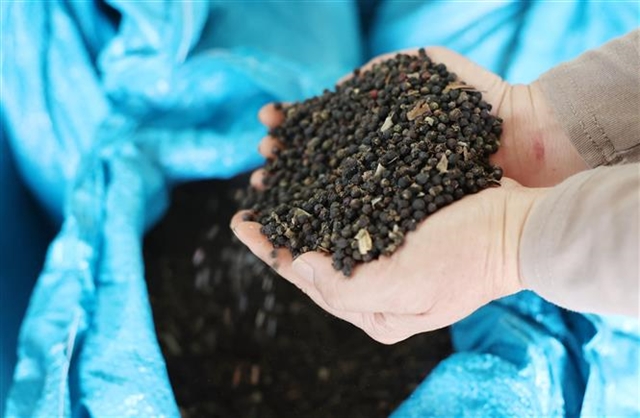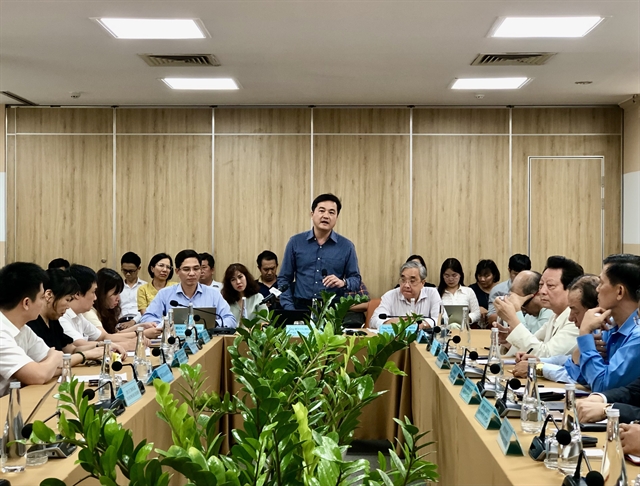 Economy
Economy

 |
| The HCM City Department of Industry and Trade held a meeting with trade associations and local businesses to discuss the difficulties likely to be caused by the US’s imposition of new tariffs on Vietnamese goods on April 8. — VNA/VNS Photo |
HCM CITY — Trade associations and businesses in HCM City voiced concerns over the US new tariff at a meeting organised by the HCM City Department of Industry and Trade on April 8.
They called on the Government to push for a delay of at least 30 days to give companies time to adapt.
With the US announcing a 10 per cent basic import tax and reciprocal duties of up to 46 per cent on Vietnamese goods, numerous industries including wooden furniture, textiles and garments, footwear, electronics, and seafood face severe impacts.
Nguyễn Chánh Phương, vice chairman of the Handicraft and Wood Industry Association of HCM City (HAWA), said last year wood and wood product exports had reached US$16.25 billion, with the US being the largest market, accounting for more than 55 per cent.
The tariff hike has caused great concern within the industry, he said.
“In the first few days [after hearing the news], many businesses were deeply worried, fearing immediate order cancellations or export disruptions.
“However, as of this morning, exports are continuing as usual, and large firms have yet to suspend orders, and so a sense of calm is returning.”
Vietnamese businesses and their US partners are currently discussing whether to suspend orders and how best to respond to the new situation, he said.
HAWA has called on the Government to swiftly negotiate with the US to seek mutually beneficial outcomes, minimise the tariff impacts and delay the tariff imposition by 45–90 days to give companies time to adapt.
It also seeks financial support for affected businesses, including preferential loans, income tax cuts and quick refund of VAT paid on affected orders.
It has asked the Government to set up a centralised, official information channel and organise guidance sessions to help businesses navigate the new challenges, including legal and commercial advice for pending shipments.
Over the longer term Phương sought stronger Government support for trade promotion initiatives to help businesses explore new markets.
He stressed the importance of strengthening the domestic market to reduce reliance on exports.
He said the Government should offer special tax incentives for wooden products manufactured in Việt Nam using at least 50 per cent timber imported from the US and then re-exported to that market.
He said this model could also apply to other industries.
Nguyễn Văn Khánh, vice chairman of the HCM City Leather and Footwear Association, echoed the concerns, warning that a 46 per cent tariff would be unsustainable even if overseas partners agreed to share half the cost.
He said some buyers have already suggested canceling orders set for delivery in May.
Enterprises need time to prepare and resources to support their workers, he said, expressing the hope that government negotiations would help bring the tariffs down to more reasonable levels and delay imposition of the new tariffs by 30–45 days to minimise the impact on shipments currently en route from Việt Nam to the US.
The trade associations and businesses also proposed a range of additional solutions to help firms adjust to the new trade environment like encouraging technology transfer, supporting access to new markets, increasing public investment, and enhancing supporting industries and supply chains.
City's government agencies emphasised that businesses should also take the initiative by exploring opportunities offered by Việt Nam’s various free trade agreements and expanding in the domestic market.
Bùi Tá Hoàng Vũ, director of the city Department of Industry and Trade, said all feedback and proposals from the meeting would be submitted to the People’s Committee to shape effective support policies.
His department would expand and diversify support programmes like investment stimulus packages and the bank-business linkage programme to help business groups and enterprises navigate and adapt to this new reality. — VNS




